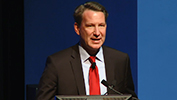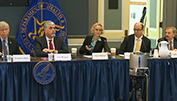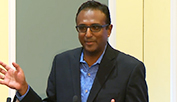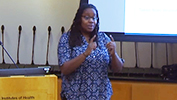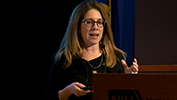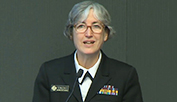-
- NIH VideoCast - New Insights into Mechanisms that Generate Primary and Peripheral B Cell Repertoires
-
- - Frederick W. Alt, Ph.D., Howard Hughes Medical Institute (HHMI) Investigator, Director, Cellular and Molecular Medicine (PCMM), Boston Children`s Hospital (2017/12/15)
- - Category : Immunology
- Immunonology IG Seminar
Frederick W. Alt is a Howard Hughes Medical Institute (HHMI) Investigator and Director of the Program in Cellular and Molecular Medicine (PCMM) at Boston Children`s Hospital (BCH). He is the Charles A. Janeway Professor of Pediatrics and Professor of Genetics at Harvard Medical School. He works on elucidating mechanisms that generate antigen receptor diversity and, more generally, on mechanisms that generate and suppress genomic instability in mammalian cells, with a focus on the immune and nervous systems. Recently, his group has developed senstive genome-wide approaches to identify mechanisms of DNA breaks and rearrangements in normal and cancer cells. He has been elected to the U.S. National Academy of Sciences, the U.S. National Academy of Medicine, and the European Molecular Biology Organization. His awards include the Albert Szent-Gyorgyi Prize for Progress in Cancer Research, the Novartis Prize for Basic Immunology, the Lewis S. Rosensteil Prize for Distinugished work in Biomedical Sciences, the Paul Berg and Arthur Kornberg Lifetime Achievement Award in Biomedical Sciences, and the William Silan Lifetime Achievement Award in Mentoring from Harvard Medical School
NIH VideoCast - New Insights into Mechanisms that Generate Primary and Peripheral B Cell Repertoires
-
- NIH VideoCast - NCI Town Hall - December 2017
-
- - Dr. Sharpless, Director, NCI, NIH (2017/12/14)
- - Category : Special
- The NCI Director will be presenting a Town Hall to all NCI Staff. The title of his talk is "Dr. Sharpless: Perspectives from the NCI Director
NIH VideoCast - NCI Town Hall - December 2017
-
- NIH VideoCast - Cutting Edge Science Meeting Series to end the Opioid Crisis - Using Science to Inform Practice and Policy: A Coordinated Approach to Research Priority Setting
-
- - NIDA, NIH (2017/12/13)
- - Category : Conferences
- This meeting is to learn and discuss the top priorities of the leaders of several key public and private agencies/organizations working on prevention and treatment of opioid non-medical use and addiction that can be best addressed with new evidence.
NIH VideoCast - Cutting Edge Science Meeting Series to end the Opioid Crisis - Using Science to Inform Practice and Policy: A Coordinated Approach to Research Priority Setting
-
- NIH VideoCast - NIH Behavioral and Social Sciences Research Festival 2017
-
- - OBSSR, NIH (2017/12/12)
- - Category : Conferences
- The Office of Behavioral and Social Sciences Research (OBSSR), in collaboration with the NIH Behavioral and Social Sciences Research Coordinating Committee (BSSR-CC), will hold the annual NIH Behavioral and Social Sciences Research Festival on the NIH campus, William H. Natcher Conference Center.
The purpose of the research festival is to:
??? Inform the wider BSSR community, stakeholders, and NIH Institutes and Centers (ICs) about the latest BSSR funded by the NIH and its overall impact and importance across the entire field of biomedical research.
??? Assist the ICs with the establishment of research priorities and the coordination of their programmatic efforts, thus minimizing redundancy and maximizing returns on NIH investments in BSSR.
??? Highlight exciting research results, emerging areas, and innovations in health-related BSSR.
??? Enable efficient leveraging of NIH resources and expertise.
NIH VideoCast - NIH Behavioral and Social Sciences Research Festival 2017
-
- NIH VideoCast - Towards the assembly of a synthetic bacterial cell
-
- - Kumaran Ramamurthi, Ph.D., Senior Investigator, Laboratory of Molecular Biology, CCR, NCI, NIH (2017/12/12)
- - Category : NIH Director`s Seminars
- NIH Director`s Seminar Series
Bacterial spores, amongst the hardiest organisms on earth, are dormant cell types produced by certain species to protect the cell???s genetic material from harsh environmental conditions. Spores of Bacillus subtilis are encased in a thick protein shell, the ???coat???, which participates in conferring the amazing resistance properties of spores. Using a combination of classical genetics and biochemistry, buttressed by cytological, biophysical, and computational techniques, we are studying spore coat assembly to understand how cells build and localize large static biological structures. We discovered that the basement layer of the coat contains a novel cytoskeletal protein that polymerizes irreversibly in an ATP hydrolysis-dependent manner. This protein is anchored to the surface of the developing spore by a small shape-sensing protein that we discovered preferentially embeds in convex membranes. Recently, we have reconstructed the basement layer of the spore coat in vitro around spherical lipid bilayers supported by small silica beads to create synthetic spore-like particles, the surfaces of which we can covalently modify so that they may display proteins and molecules of interest. We are currently investigating the utility of these bacteria-sized particles as vaccine display platforms and tissue-specific drug delivery vehicles.
NIH VideoCast - Towards the assembly of a synthetic bacterial cell
-
- NIH VideoCast - Pathways to Prevention Workshop: Methods for Evaluating Natural Experiments in Obesity (Day 2)
-
- - NIH (2017/12/09)
- - Category : Conferences
- Hear presentations from experts in obesity research, as well as discussions on the systematic evidence review written for the workshop by an Agency for Healthcare Research & Quality (AHRQ) Evidence-based Practice Center. VideoCast workshop attendees will have the opportunity to comment on the workshop proceedings using the VideoCast Feedback Form below or using the comments on the workshop website.
The NIH is hosting the Pathways to Prevention Workshop: Methods for Evaluating Natural Experiments in Obesity on December 5???6, 2017, to assess the available scientific evidence and to better understand relevant, high-quality natural experiment research designs in the field of obesity prevention and control.
This workshop is designed for obesity researchers, practitioners, and others in related fields who are interested in obesity prevention and control and in natural experiment research.
This workshop is sponsored by the Office of Disease Prevention (ODP), the National Cancer Institute (NCI), the National Heart, Lung, and Blood Institute (NHLBI), and the National Institute of Diabetes and Digestive and Kidney Diseases (NIDDK).
For more information go to https://prevention.nih.gov/p2p-workshop/2017/methods-evaluating-natural-experiments-obesity
NIH VideoCast - Pathways to Prevention Workshop: Methods for Evaluating Natural Experiments in Obesity (Day 2)
-
- NIH VideoCast - Extension of Hydroxyl Radical-Based Footprinting Coupled with Mass Spectrometry for In Cell and In Vivo Protein Analysis
-
- - Lisa M. Jones, Ph. D., Assistant Professor, Department of Pharmaceutical Sciences, University of Maryland School of Pharmacy (2017/12/09)
- - Category : Proteomics
- Proteomics Interest Group
In recent years, protein footprinting coupled with mass spectrometry has been used to identify protein-protein interaction sites and regions of conformational change through modification of solvent accessible sites in proteins. Hydroxyl radical-based footprinting (HRBF) approaches utilize hydroxyl radicals to oxidatively modify the side chains of solvent accessible amino acids. There are several approaches to generate radicals for oxidation including synchrotron radiation and electrochemistry. One HRBF method, fast photochemical oxidation of proteins (FPOP), utilizes an excimer laser for photolysis of hydrogen peroxide to generate hydroxyl radicals. To date, HRBF methods have been used in vitro on relatively pure protein systems. We have further extended the FPOP method for in cell analysis of proteins. This will allow for study of proteins in their native cellular environment and be especially useful for the study of membrane proteins which can be difficult to purify for in vitro studies. We have designed and built a single cell flow system to enable uniform access of cells to the laser. Results demonstrate that in cell FPOP (IC-FPOP) can oxidatively modify over 1300 proteins in various cellular compartments. Further, the method successfully probes solvent accessibility similarly to in vitro FPOP. We have further extended the method for in vivo analysis using C. elegans, members of the nematode family. C. elegans are widely used as model systems for human diseases including cancer, Parkinson???s disease, and diabetes. Preliminary results indicate a number of proteins can be oxidatively modified in C. elegans byin vivo FPOP (IV-FPOP) leading to the possibility of studying protein structure in human diseases directly in animal model systems. However, further optimization of the method is required to increase the number of oxidatively modified proteins.
NIH VideoCast - Extension of Hydroxyl Radical-Based Footprinting Coupled with Mass Spectrometry for In Cell and In Vivo Protein Analysis
-
- NIH VideoCast - Challenges and Opportunities in Health Disparities Research
-
- - Ana V. Diez Roux, M.D., Ph.D., M.P.H., Dean and Distinguished University Professor of Epidemiology, Dean`s Office, Epidemiology and Biostatistics, Urban Health Collaborative, Drexel University (2017/12/09)
- - Category : Health Disparities
- NIMHD Director???s Seminar Series
The National Institute on Minority Health and Health Disparities (NIMHD) has launched the NIMHD Director???s Seminar Series (DSS). This forum highlights novel research discoveries by prominent researchers who are advancing the science of minority health and health disparities.
The objectives of Dr. Diez Roux presentation will include:
???Understanding conceptual models of health disparities, implications for research and action
???Addressing Methodological challenges
???Emerging directions and promising areas for collaboration
Dr. Diez Roux is Dean and Distinguished University Professor of Epidemiology in the Dornsife School of Public Health at Drexel University. She is a physician and epidemiologist, known internationally for her research on the social determinants of health. For more than 20 years, her work has impacted public health research, policy and practice.
Dr. Diez Roux received an M.D. from the University of Buenos Aires, a master???s degree in public health and doctorate in health policy and management from the Johns Hopkins School of Hygiene and Public Health.
For more information go to https://nimhd.nih.gov/news-events/conferences-events/directors-seminar-series/2017/dss_120717.html
NIH VideoCast - Challenges and Opportunities in Health Disparities Research
-
- NIH VideoCast - ORWH Seminar Series: Sex and Pain - What`s the Story
-
- - Jeff Mogil, Ph.D., McGill University (2017/12/09)
- - Category : Women`s Health
- The first seminar of the series, ???Sex and Pain: What`s the Story???? will explore the science of sex influences on pain and associated mortality. This event will also highlight women-specific aspects of pain in relation to the opioid epidemic.
Keynote Speaker: Dr. Jeffrey Mogil, McGill University, ???Pain, Sex, and Death.???
Panel Discussion:
Dr. Roger Fillingim, University of Florida, ???Women in Pain: Morbidity and Mortality.???
Dr. Hanna Grol-Prokopczyk, University of Buffalo, ???Do Sex Differences in Pain Differ Across Racial/Ethnic and Socioeconomic Groups????
Dr. Ann Berger, NIH, ???Psychosocial Aspects of Pain and Healing in Palliative Care.???
Dr. Siob??n D. Harlow, University of Michigan, ???Pain at Midlife: Evidence from the Multiethnic Study of Women`s Health Across the Nation (SWAN).???
Dr. Marjorie R. Jenkins, FDA, ???Opioid Epidemic: Sex and Gender Influences.???
Closing Remarks: Dr. David Thomas, NIDA/NIH Pain Consortium.
Continuing education credits available. Please complete registration to receive credits at
https://www.nih.gov/women
NIH VideoCast - ORWH Seminar Series: Sex and Pain - What`s the Story
-
- NIH VideoCast - Chromatin regulation of lymphocyte-niche interactions from progenitor cell fate to mature effector cell function
-
- - Katia Georgopoulos, Ph.D., Cutaneous Biology Research Center, Massachusetts General Hospital (2017/12/08)
- - Category : Immunology
- Immunonology IG Seminar
NIH VideoCast - Chromatin regulation of lymphocyte-niche interactions from progenitor cell fate to mature effector cell function
-
- NIH VideoCast - Pathways to Prevention Workshop: Methods for Evaluating Natural Experiments in Obesity (Day 1)
-
- - NIH (2017/12/07)
- - Category : Conferences
- Hear presentations from experts in obesity research, as well as discussions on the systematic evidence review written for the workshop by an Agency for Healthcare Research & Quality (AHRQ) Evidence-based Practice Center. VideoCast workshop attendees will have the opportunity to comment on the workshop proceedings using the VideoCast Feedback Form below or using the comments on the workshop website.
The NIH is hosting the Pathways to Prevention Workshop: Methods for Evaluating Natural Experiments in Obesity on December 5???6, 2017, to assess the available scientific evidence and to better understand relevant, high-quality natural experiment research designs in the field of obesity prevention and control.
This workshop is designed for obesity researchers, practitioners, and others in related fields who are interested in obesity prevention and control and in natural experiment research.
This workshop is sponsored by the Office of Disease Prevention (ODP), the National Cancer Institute (NCI), the National Heart, Lung, and Blood Institute (NHLBI), and the National Institute of Diabetes and Digestive and Kidney Diseases (NIDDK).
For more information go to https://prevention.nih.gov/p2p-workshop/2017/methods-evaluating-natural-experiments-obesity
NIH VideoCast - Pathways to Prevention Workshop: Methods for Evaluating Natural Experiments in Obesity (Day 1)
-
- NIH VideoCast - Joseph J. Kinyoun Memorial Lecture - Antibodies Against Ebola and Lassa: A Global Collaboration
-
- - Erica Ollmann Saphire, Ph.D., Director, Viral Hemorrhagic Fever Immunotherapeutic Consortium (2017/12/07)
- - Category : Joseph J. Kinyoun - Infection and Immunity
- Joseph J. Kinyoun Memorial Lecture 2017
Dr. Erica Ollmann Saphire, director of the Viral Hemorrhagic Fever Immunotherapeutic Consortium (VIC), will deliver the 2017 Joseph J. Kinyoun Memorial Lecture.
Her talk, ???Antibodies Against Ebola and Lassa: A Global Collaboration,??? will explore the features of antibodies that protect against these deadly viruses and the ongoing need for scientists to collaborate in this research to establish a complete knowledge base. During the past three years, VIC researchers from dozens of labs on five continents have studied these protective antibodies. The VIC aims to fill critical knowledge gaps and provide a foundation of research that can be used to improve existing vaccines and antivirals, and to evaluate the pipeline of candidate countermeasures.
Ollmann Saphire, who has served as VIC director since 2013, investigates the structural biology of both viruses and antibodies???how viruses like Ebola, Marburg and Lassa infect host cells, what the viruses??? weaknesses are, and which antibody combinations might defeat them. This work has led to surprising and substantial discoveries in virology: Her team recently discovered that some viral proteins can change their 3D structures to play several different roles, allowing more information and more function to be encoded in concise viral genomes.
Ollmann Saphire received her Ph.D. in Macromolecular and Cellular Structure and Chemistry from The Scripps Research Institute (SRI) in 2000. She has since held a number of positions at TSRI, where she is currently a professor of Immunology and Microbial Science. Her work has been recognized with a Presidential Early Career Award for Scientists and Engineers by the Burroughs Wellcome Fund, and young investigator awards from The American Society for Biochemistry and Molecular Biology, the American Society for Microbiology, and the International Society for Antiviral Research. She is a fellow of both the American Academy of Microbiology and the American Association for the Advancement of Science, and serves on the Scientific Leadership Board of the Global Virus Network.
Since 1979, NIAID has hosted an annual public lecture in honor of Dr. Joseph J. Kinyoun. In 1887, Kinyoun founded the Laboratory of Hygiene???the forerunner of NIH???paving the way for more than a century of groundbreaking medical discoveries since then.
For more information go to https://www.niaid.nih.gov/news-events/2017-kinyoun-lecture
NIH VideoCast - Joseph J. Kinyoun Memorial Lecture - Antibodies Against Ebola and Lassa: A Global Collaboration
-
- NIH VideoCast - Ethics Rounds: Ethics Rounds Who Should Apologize for Medical Mistakes?
-
- - Rebecca Dresser JD, MS Daniel Noyes Kirby Professor of Law and Professor of Ethics, School of Medicine, Washington University, St. Louis and Laura M. Lee, MS, RN, Director, Office of Patient Safety and Clinical Quality, Clinical Center, NIH (2017/12/07)
- - Category : Clinical Center Grand Rounds
- Ethics Rounds: Ethics Rounds Who Should Apologize for Medical Mistakes?
Medical error is a frequent consequence of relying on human beings to take care of patients. Medical error also can be devastating for patients, families, clinicians and health care institutions. Professional associations, patients, safety experts, hospital accreditation standards and many U.S. states now endorse or require disclosure of medical errors. However, there remains significant debate regarding how medical errors should be disclosed. Please join us to discuss a critical part of this debate: who should disclose and apologize for medical errors?
For more information go to http://www.cc.nih.gov/about/news/grcurrent.html
NIH VideoCast - Ethics Rounds: Ethics Rounds Who Should Apologize for Medical Mistakes?
-
- NIH VideoCast - TRACO 2017: Pancreatic cancer and Nanotechnology
-
- - S. Perwez Hussain, Ph.D., NCI, NIH and Marina Dobrovolskaia, PhD, MBA, NCI, NIH (2017/12/06)
- - Category : TRACO
- Translational Research in Clinical Oncology (TRACO)
Recent advances in understanding cancer biology are beginning to be translated into improvements in diagnosis and treatment of cancer. In the post-genome era, we increasingly rely on strong collaboration between basic and clinical scientists to develop novel approaches for treatment of human disease. The NCI Center for Cancer Research (CCR) is one of the largest cancer research organizations in the world, with more than 200 principal investigators, and has played a major role in developing and implementing many new technologies, such as nanotechnology, next generation sequencing, genomics and proteomics.
For more information go to http://ccr.cancer.gov/training/trainee-resources/courses-workshops/traco
NIH VideoCast - TRACO 2017: Pancreatic cancer and Nanotechnology
-
- NIH VideoCast - Joint Meeting of the NCI Board of Scientific Advisors and the National Cancer Advisory Board - November 2017
-
- - NCI, NIH (2017/12/02)
- - Category : National Cancer Advisory Board
- The 10th Joint Meeting of the NCI Board of Scientific Advisors and the National Cancer Advisory Board
NIH VideoCast - Joint Meeting of the NCI Board of Scientific Advisors and the National Cancer Advisory Board - November 2017
-
- NIH VideoCast - Lasker Lessons in Leadership: International Medicine & Global Health
-
- - Anne Schuchat, MD, Acting Director, CDC (2017/12/02)
- - Category : Special
- Lasker Lessons in Leadership is a lecture series aimed at bringing top scientists and medical leaders to the NIH to serve as inspiration for future leadership amongst the MD/PhD and PhD students enrolled in the NIH Oxford-Cambridge Scholars Program and the NIH Lasker Clinical Research Scholars Program. Presented by the Albert and Mary Lasker Foundation, the International Biomedical Research Alliance, and the NIH Oxford-Cambridge Scholars Program.
NIH VideoCast - Lasker Lessons in Leadership: International Medicine & Global Health
-
- NIH VideoCast - Clinicopathologic Grand Rounds: Clinical Cases from the NIH Clinical Center: Gigantism: New Lessons from an Ancient Disease
-
- - (1) Andrew Demidowich, MD, Assistant Research Clinician, Office of the Clinical Director, NICHD, NIH (2) Constantine Stratakis, MD, D(Med)Sc, Scientific Director and Senior Investigator, Section on Genetics and Endocrinology, NICHD, NIH (3) Prashant Chittiboina, MD, MPH, Assistant Clinical Investigator, Neurosurgery Unit for Pituitary and Inheritable Diseases, NINDS, NIH (2017/12/01)
- - Category : Clinical Center Grand Rounds
- Clinicopathologic Grand Rounds: Clinical Cases from the NIH Clinical Center:
Gigantism: New Lessons from an Ancient Disease
For more information go to http://www.cc.nih.gov/about/news/grcurrent.html
NIH VideoCast - Clinicopathologic Grand Rounds: Clinical Cases from the NIH Clinical Center: Gigantism: New Lessons from an Ancient Disease
-
- NIH VideoCast - The two faces of the IL-15- Janus Kinase-Stat system: implications for the immunotherapy of autoimmune diseases and cancer
-
- - Thomas A. Waldmann, M.D., National Cancer Institute, NIH (2017/12/01)
- - Category : WALS - Wednesday Afternoon Lectures
- NIH Director`s Wednesday Afternoon Lecture Series
Dr. Walmann will present the annual William Paul lecture. Dr. Waldmann defined the IL-2 receptor alpha and beta subunits using the daclizumab antibody he discovered, an antibody that is approved by the FDA. He co-discovered IL-15 and performed the first in-human clinical trial with this agent in patients with malignancy. Furthermore, Waldmann defined molecular abnormalities of the common gamma cytokine, Jak/Stat signaling pathway in HTLV-1 associated adult T-cell lymphoma and translated this discovery with a trial of a Jak inhibitor in patients with this disorder.
For more information go to https://oir.nih.gov/wals
NIH VideoCast - The two faces of the IL-15- Janus Kinase-Stat system: implications for the immunotherapy of autoimmune diseases and cancer
-
- NIH VideoCast - Monocyte Heterogeneity: Implications for Cancer
-
- - Catherine ???Lynn??? Hedrick, Ph.D., Professor, Division of Inflammation Biology, La Jolla Institute for Allergy and Immunology (2017/12/01)
- - Category : Immunology
- Immunonology IG Seminar
Monocytes are key cells that drive the rapid innate immune response. We discovered that a subset of monocytes, nonclassical monocytes (CD14dim in humans and Ly6C- in mice), function in the vasculature to recognize metastasizing tumor cells. Once these cells recognize tumor cells, they orchestrate the killing of these cells to prevent metastasis. This presentation will discuss how nonclassical monocytes regulate tumor cell killing, and will discuss the possible use of nonclassical monocytes in cancer immunotherapy.
NIH VideoCast - Monocyte Heterogeneity: Implications for Cancer
-
- NIH VideoCast - TRACO 2017: Epigenetics and Case reports
-
- - Mukesh Verma, Ph.D., CCR, NCI, NIH and Oluwadamilola Olaku, MD., M.P.H., MRCOG, OCCAM, NCI, NIH (2017/11/29)
- - Category : TRACO
- Translational Research in Clinical Oncology (TRACO)
Recent advances in understanding cancer biology are beginning to be translated into improvements in diagnosis and treatment of cancer. In the post-genome era, we increasingly rely on strong collaboration between basic and clinical scientists to develop novel approaches for treatment of human disease. The NCI Center for Cancer Research (CCR) is one of the largest cancer research organizations in the world, with more than 200 principal investigators, and has played a major role in developing and implementing many new technologies, such as nanotechnology, next generation sequencing, genomics and proteomics.
For more information go to http://ccr.cancer.gov/training/trainee-resources/courses-workshops/traco
NIH VideoCast - TRACO 2017: Epigenetics and Case reports




